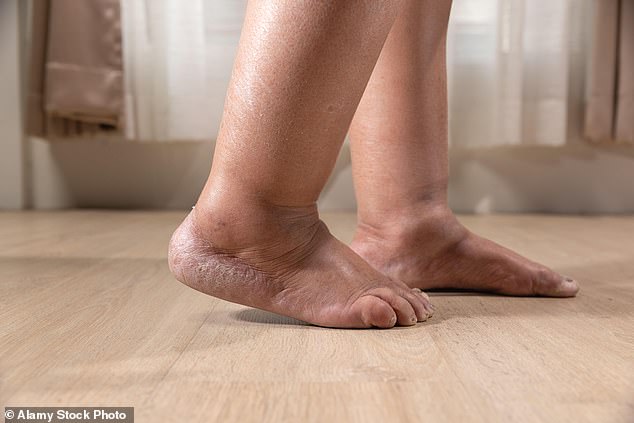Women blighted by an abnormal build-up of fat in their legs are reporting that their disabling symptoms are eased by weight-loss jabs such as Ozempic.
The condition, lipoedema, leads to a woman’s limbs becoming disproportionately large, even when the rest of the body is slim.
It affects up to one in ten women and causes issues with self-confidence and mobility – and until now there has been no drug treatment.
However, lipoedema patients say the injections, which are primarily given to diabetics and obese people to help them lose weight, can cause a dramatic improvement.
Last week, Mail on Sunday GP Dr Ellie Cannon wrote in her column that she was disappointed there were not more treatments available to lipoedema patients.


In response we were flooded with emails from women with the condition who have experienced remarkable improvements after taking the new weight-loss medicines, which also include Wegovy and Mounjaro.
While there are no clinical studies that prove that these jabs help with lipoedema, news of their positive effect has spread through patient groups on Facebook, they say.
Some doctors are also advising their lipoedema patients to go private to access the drugs – because they are not eligible for the jabs on the NHS. Some patients are now paying more than £200 a month for supplies, and are calling on the NHS to fund the treatment.
Hayley Brook, 42, says that, until she got a private Ozempic prescription, she suffered near-constant joint pain in her legs which were so large they ‘looked like columns’.
But within a week of beginning the treatment, Hayley says her limbs were slimmer. ‘I saw a huge reduction in pain and I feel like I have my life back,’ she added.
Deborah Doak, 64, who has lived with lipoedema since her teens, says taking Mounjaro for ten weeks has changed her life. Not only did she lose more than 22lb (10kg), the size of her legs was significantly reduced.
‘I have been trying all my life to lose weight and manage my condition, but nothing worked,’ says the shipping worker from Ashford, Kent. ‘Now my legs feel lighter and it has taken a lot of pressure off my knees and joints.

‘I have returned to work and it has allowed me to be more active. It’s been a life-changer.’
Experts say the drugs could revolutionise life for those with lipoedema and now want pharmaceutical firms to launch clinical trials to prove their effectiveness. This would allow it be rolled out on the NHS.
Dr Lesley Steinitz, head of research at Lipoedema UK, says: ‘We are pushing for a trial to see whether these drugs should be offered widely for lipoedema.’
Experts are unsure what causes lipoedema, but it may be linked to changes in hormones due to puberty, pregnancy or the menopause. Research suggests it runs in families.
While there is no effective treatment, the NHS recommends managing the symptoms with diet, exercises and compression socks. In severe cases, liposuction may be offered.
Debate has long run over whether the condition is weight-related, because most patients insist that lifestyle changes – such as dieting – make no difference.
For this reason, drugs such as Ozempic have not been considered a potential treatment.
The new weight-loss medicines stop the body from producing hunger hormones, meaning users do not feel the desire to eat. Obese people taking them can lose up to a third of their bodyweight within a year.
Studies have shown that people taking them are less likely to develop cancer, heart disease, Alzheimer’s and a raft of other obesity-related conditions.
‘These injections also have an anti-inflammatory effect, and I think this, alongside the weight-loss patients are experiencing, is why lipoedema patients find their symptoms are relieved,’ says Dr Harvinder Chahal from the London Endocrine Centre and Imperial College London.
‘This is an ill-appreciated condition and we are finally seeing benefits from a treatment.
‘But we need research data to assess why this is happening and who it can help.’
Social media influencer Rebecca Hickson, 35, who often posts about living with lipoedema, has also experienced positive affects after starting Mounjaro last month.
‘Within the first week I saw a dramatic difference in the size of my legs and was suffering less pain from the inflammation,’ says Rebecca from Stockport.
‘Before the injections, I had days where I couldn’t use the stairs and my legs felt like they were going to give way – it was like dragging down dead weights.
‘I have struggled with the condition since I was 12, and in recent years felt suicidal after it became worse. I have tried everything, but this feels like the first thing where I have seen a benefit.’
What’s the difference between tonsillitis and laryngitis?
Both of the terms describe infections of the throat but they affect different areas.
Tonsillitis is inflammation of the tonsils at the back of the throat, which causes painful swallowing and sees them swell up and turn red, as well as often breaking out in white or yellow spots. It’s caused by either bacterial or viral infections.
Laryngitis affects the voice box, leading to hoarseness or complete loss of voice, along with a dry cough and sore throat. Unlike tonsillitis, which can require antibiotics, laryngitis is usually viral and improves on its own.

